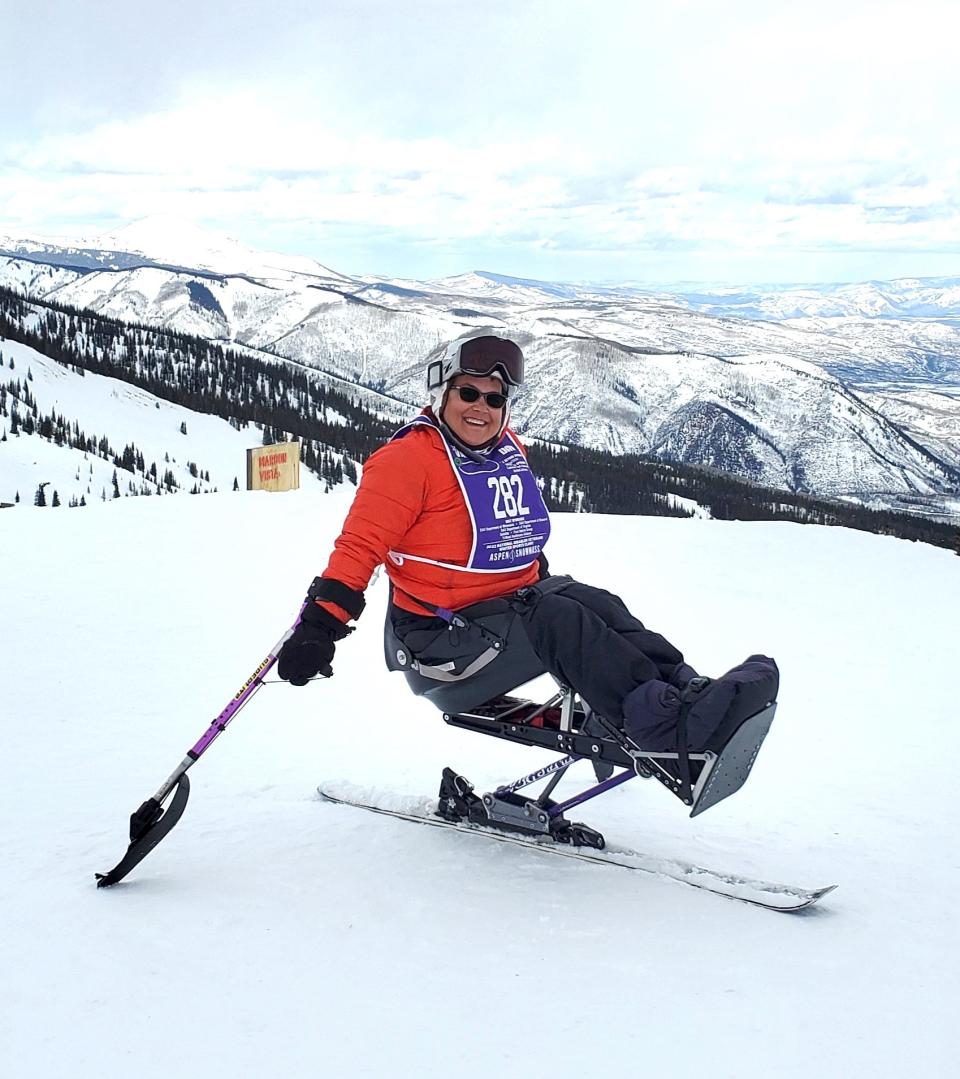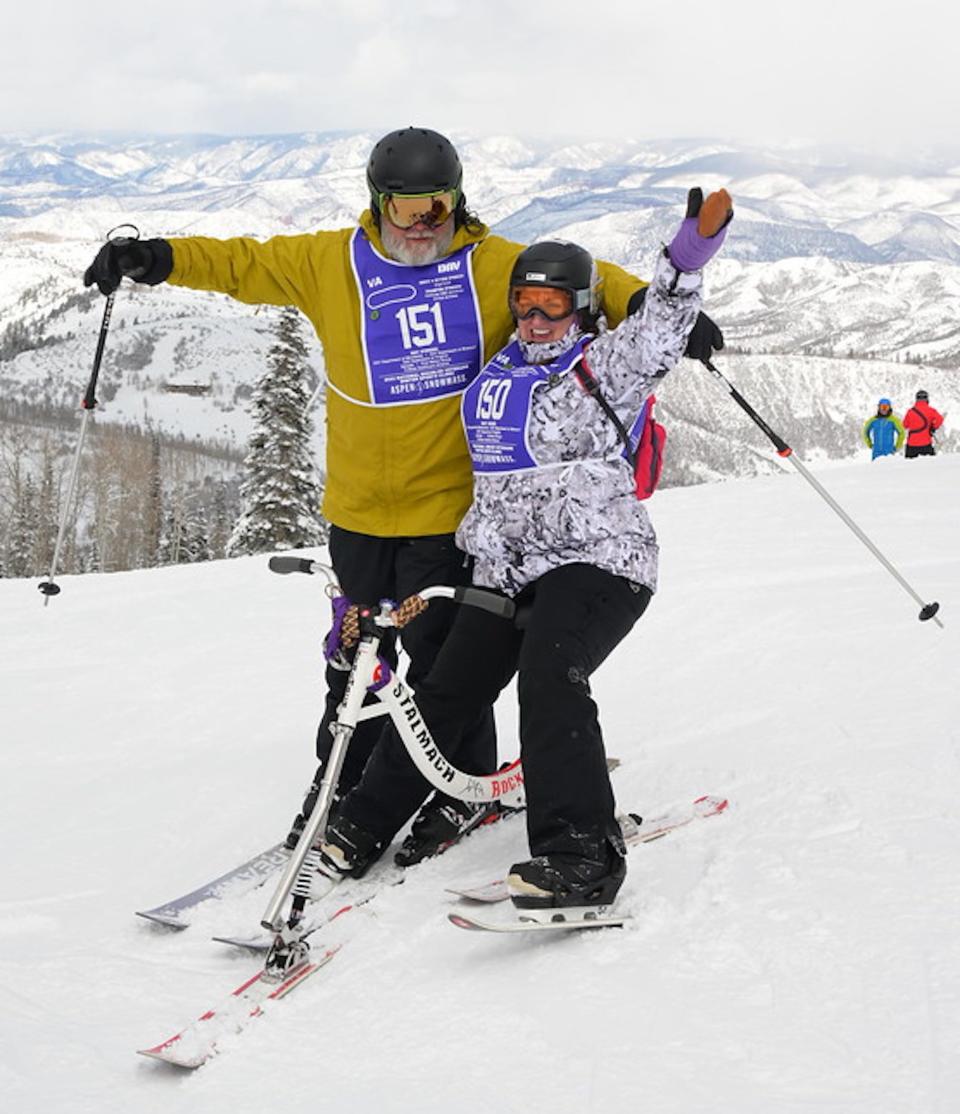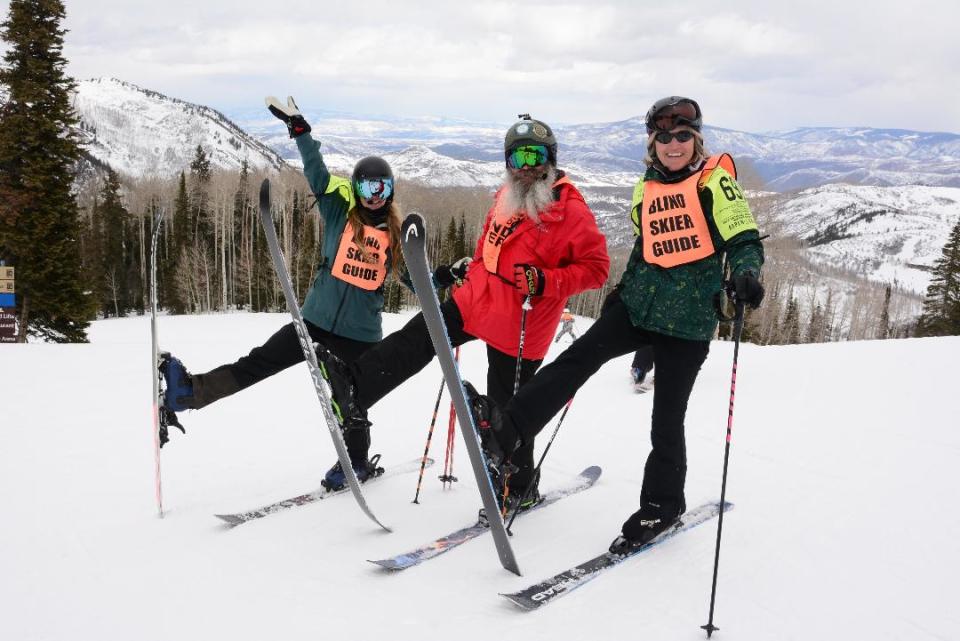The game’s not over for these disabled veterans
Pawtucket native Tina Lavallee is 55, a former three-sport athlete at Shea High School. She was a parachutist, a staff sergeant and a Gulf War veteran 12 years into an Army career when she suffered a devastating injury in a line-of-duty accident that forced her medical retirement. Reliant on a wheelchair, she thought her active sports career was over as well.
In 2017 Tina’s daughter-in-law found an ad about the Disabled Veterans Summer Sports Clinic in Providence. Tina enrolled and learned about the winter event run jointly by the VA and Disabled American Veterans.
“I have participated every year since,” she said.
Several veterans from this area were among more than 350 nationwide, ranging in age from 22 to 86, who participated during March in the 37th National Disabled Veterans Winter Sports Clinic in Aspen-Snowmass, Colorado.
“Adaptive sports and recreation programs help veterans with disabilities participate in activities they may have felt were out of reach,” said Jenny Vulpis, adaptive sports case manager for the VA Boston Healthcare System, who traveled with the veterans to Colorado.
Vietnam soldier made a promise to God: He spent the rest of his life living up to it
As one veteran put it, all the participants are banged up, beaten and broken in some way, but they all speak the same language, and they understand one another.
“This sports rehab program is the best thing that has happened to me,” said Lavallee.
It gave her back some capabilities she thought she had lost forever.
“Knowing that you can still accomplish things in sports transfers to knowing you can still do other things in your daily life,” she explained.
“Disabled Sports has empowered me not only on the mountain but off as well.”

Adaptive skiing: With the right tools, anything is possible
Rob Sanchas, 55, a Gulf War Army veteran from Warren who lost most of his eyesight in an on-duty accident, also took part in the event. He lives with post-traumatic stress disorder and has difficulty with crowds.
“I loved skiing,” Rob told me, “But how could I ski if I can’t see?”
Jenny Vulpis was his VA therapist. When he started working with her, she asked if he used to ski.
“If I could only do one sport for the rest of my life, skiing would be it,” he replied. “It’s an amazing sport, and I lost it.”
“Maybe not,” said Jenny.
The adaptive sports program gave Rob back something he thought was lost forever.
“I saved up to go on this trip to Colorado and then signed up for everything I could.”
Unlike many of his fellow participants, Rob still had the use of his legs, so he participated as an upright skier. He can make out shapes and shadows and can still distinguish the color orange.
“So I wore an orange bib saying “Blind Skier,” and I skied with guides. They also wore orange bibs and would help keep me going in the right direction by speaking through a headset.”
Retired Army Sgt. Maj. Roland Cagnon, of Pascoag, was injured in a car-bomb explosion in Iraq in 2005. His wife, Joyce, deployed to both Iraq and Afghanistan as a chaplain’s assistant and was a medevac from Afghanistan. Both are medically retired.
Roland had been a certified alpine instructor. He had volunteered for several years at New England Disabled Sports. Roland and Joyce went to Snowmass as participants. Since they both have some use of their legs, they ski with different types of adaptive equipment; Joyce uses a ski-bike.

It's not just skiing at the National Disabled Veterans Winter Sports Clinic
With the correct equipment, almost everything is possible. Sports offerings included indoor kayaking, snowmobiling, curling, sled hockey, cross-country skiing, snowshoeing, a rock wall for climbing and scuba diving in the pool.
“Unfortunately, you can't do them all,” said Lavallee. "Everyone gets to ski on two days and do two extra activities.”
“Due to the timing of openings and cancellations, I was able to do five activities,” said Sanchas, “I was like a kid in a candy store.”
He was able to try fly fishing, as well as scuba diving and rock climbing.
“I really loved sled hockey the best,” he concluded. “It’s really competitive, and what they can do with the audible pucks is amazing."
The puck is larger (5½ inches wide as opposed to 3). It is metal, and ball bearings rattle around inside so one can follow the sound of the puck as it travels around the ice.

It’s still expensive for veterans to participate
The cost can be anywhere from $2,000 to $5,000, depending on the location of the event, caregiver requirements and the type of accommodation desired.
The VA, DAV and corporate sponsors cover the costs of the activities. However, veterans have to get there on their own and pay for accommodations.
“Team Chowdah" is from Massachusetts, New Hampshire, Maine, Vermont and Rhode Island, said Lavallee, adding, “United Airlines flew us at a reduced rate, and Snowmass hotels also gave us a discount.”
If anyone is willing to sponsor one or more veterans to participate in future events, please reach out to Jenny Vulpis at the VA Boston Healthcare System. She can set up a fund to support local veterans who might otherwise be unable to attend national programs.
Jenny’s office phone is (774) 826-1955, and her email is jenny.vulpis@va.gov
“It’s really a miracle on the mountain,” concludes Rob.
Announcements
Proposed Statewide Veterans Services Program
Rep. Camille F.J. Vella-Wilkinson, D-Warwick, has partnered with Rep. Carol Hagan McEntee, D-Narragansett, to push for the funding of a statewide Veterans Services Program. The recipient of the funding would be the Rhode Island branch of the Veterans of Foreign Wars (VFW).
The joint resolution calls for a $72,000 appropriation, which would provide a total of $100,000 when added to $28,000 already earmarked for the Veterans Service Officers (VSO) program.
“More than 63,000 veterans live in Rhode Island, and too many of them don’t know how to access their benefits,” said Vella-Wilkinson, herself a retired naval officer. “Many of our cities and towns don’t have a local office. That leaves veterans to fend for themselves in navigating sometimes confusing websites, which just isn’t a viable option for many of them."
The VFW partners with the Veterans Administration to certify VSOs across Rhode Island. They help veterans and their families with health care, housing, education and municipal tax reduction issues, as well as service-connected disability claims, job readiness, home loans and burial benefits.
Sponsors of this legislation are asking the public in general and veterans in particular to contact their local representatives and express their support.
Calendar
Saturday, May 6, at 6 p.m.: Westerly Armory Member Appreciation Evening. The event honors four people for service: Alexis Ann, Amanda Nall, William Siano, and Shawn Lacey. Entertainment will follow a stellar dinner. Tickets are $20 for Armory members and $35 for non-members. Purchase at the Armory or go online to westerlyarmory.com and click on events; you can buy tickets online. Doors open at 5 p.m. and the event begins at 6 p.m.
This article originally appeared on The Providence Journal: RI disabled veterans empowered by adaptive skiing event

